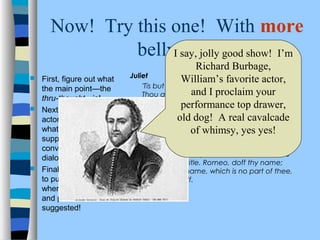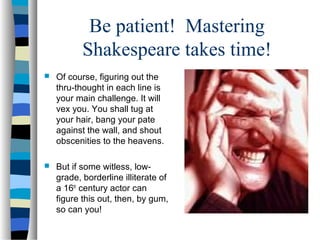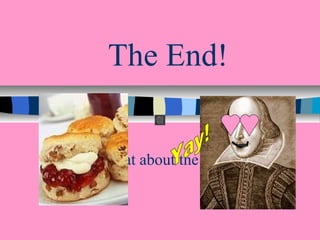How to read shakespeare
- 1. How to Read Shakespeare: William and the Scone A long and meandering presentation that goes no where in particular
- 2. This is William Shakespeare I am a literary genius! ïŪ He is the inventor of the Kneelpogo stick fearsome before my and designed visage!high powered laser a You! The nerdy looking kid!he used toawrite which Bring me dirty words on the moon. scone! ïŪ JK! ïŪ Actually, William Shakespeare is a 16th century playwright/actor (allegedly) responsible for 37 plays and 154 sonnets.
- 3. You should know a little about Shakespeareâs life For InstanceâĶ last words? They were My It is believed Shakespeare was born on April 23, 1564 in a town Good friend, for was there, forbear called Stratford. Although his residenceJesusâ sake,William spent To dig the in London. most of his life living and working dust enclosed here; Blest be the man that spares these stones And curst he that moves my bones. He was a playwright, actor, and poetâ a triple threat! Now whereâs my scone? He married an older woman for money (Anne Hathaway), and spent most of his years away from her in London. Shakespeareâs rather cold relationship with Anne later influenced his views on romance and marriage. He had three children. His only son, Hamnet, died at age 11 (no, thatâs not a typo!). Shakespeare was one of the founding members of the Globe Theater in London, where he continued to work and perform almost to the point of his death on April 23, 1616.
- 4. Shakespeare wrote three kind of plays: Tragedies, Histories, and Comedies Some famous Tragedies Some famous Hamlet Henry V Romeo and Juliet Richard III Macbeth King John Histories Some famous Comedies The Merchant of Venice A Midsummerâs Night Dream The Taming of the Shrew
- 5. Shakespeareâs legacy is formidableâhe wrote some of the most well known, most admired works in Western literature However, due to the antiquity of his language and the sophistication of his techniques, Shakespeareâs works are often challenging for modern audiences. Before reading his work, it behooves you to heed a few tips
- 6. Lesson #1 (of 1) Shakespeareâs work was meant to be read aloud!
- 7. Somebody volunteer! Read this out loud! Romeo. [JULIET appears above at a window] But, soft! what light through yonder window breaks? It is the east, and Juliet is the sun! Arise, fair sun, and kill the envious moon, Who is already sick and pale with grief, That thou her maid art far more fair than she: Be not her maid, since she is envious; Her vestal livery is but sick and green, And none but fools do wear it; cast it off. It is my lady; O! it is my love: O! that she knew she were. ïŪ Each time a character is speaking, they are presenting a single thought, also known as the thru-thought. The first task an actor/reader must accomplish is figure out what is the main idea of the speechâwhy does it exist? ïŪ Read the speech again. In your own words, what is the main thought Romeo expresses?
- 8. Okay, so you figured out Romeoâs overwhelmed with loveâ the next step is to read it that way!! Romeo. [JULIET appears above at a window] But, soft! what light through yonder window breaks? It is the east, and Juliet is the sun! Arise, fair sun, and kill the envious moon, Who is already sick and pale with grief, That thou her maid art far more fair than she: Be not her maid, since she is envious; Her vestal livery is but sick and green, And none but fools do wear it; cast it off. It is my lady; O! it is my love: O! that she knew she were. ïŪ Shakespeare would give each actor their lines about three days before the performance. The only way his actors could memorizeâ and make sense ofâthe parts was to figure out the main ideaâor thru thoughtâof each line of dialogue. Remember, just because a line ends, does not mean the thru thought is over! Keep going until itâs done! ïŪ Read this with passion! Like you are overcome! You will find that even if you donât understand the words, you still understand the point of the dialogue because you recognize the underlying emotion.
- 9. Next, pay attention to all the little clues William left you to help you figure out how it should be read Romeo. [JULIET appears above at a window] But, soft! what light through yonder window breaks? It is the east, and Juliet is the sun! Arise, fair sun, and kill the envious moon, Who is already sick and pale with grief, That thou her maid art far more fair than she: Be not her maid, since she is envious; Her vestal livery is but sick and green, And none but fools do wear it; cast it off. It is my lady; O! it is my love: O! that she knew she were. When you see one of theseââOââ do not say âoh!â This is meant to be a cry of passion, and is known as Ecphonesis O. End-stop punctuation like periods (.), question marks (?), and exclamation points (!) means the thought is complete. In other words, STOP and breathe! Commas indicate an elaboration of the main pointâthey continue the thru-thought in greater detail. When an actor encounters a comma, they should usually pause, but not long enough to take a breath. Colons and semi-colons indicate the initial thought is complete, but not the thru-thought. They should be treated like a commaâpause, but just for a moment!
- 10. Now! Try this one! With more belly-fire! good show! Iâm I say, jolly First, figure out what the main pointâthe thru-thoughtâis! ïŪ Next, read it from the actorâs perspectiveâ what are you supposed to be conveying in this dialogue excerpt? ïŪ Finally, pay attention to punctuation! Stop where itâs necessary and pause where itâs suggested! ïŪ Richard Burbage, Juliet Williamâs favorite actor, 'Tis but thy name that is my enemy; and I proclaim your Thou art thyself though, not a Montague. What's Montague? it is nor hand,drawer, performance top nor foot, Nor arm, nor face, nor any other part Belonging old dog! O! be some other name: to a man. A real cavalcade What's in a name? that which we yes! rose of whimsy, yes call a By any other name would smell as sweet; So Romeo would, were he not Romeo call'd, Retain that dear perfection which he owes Without that title. Romeo, doff thy name; And for that name, which is no part of thee, Take all myself.
- 11. Be patient! Mastering Shakespeare takes time! ïŪ Of course, figuring out the thru-thought in each line is your main challenge. It will vex you. You shall tug at your hair, bang your pate against the wall, and shout obscenities to the heavens. ïŪ But if some witless, lowgrade, borderline illiterate of a 16th century actor can figure this out, then, by gum, so can you!
- 12. The End! But what about the scone?!?

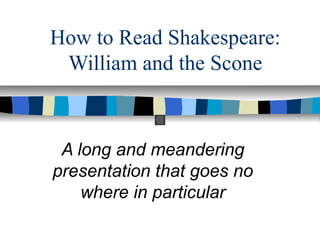
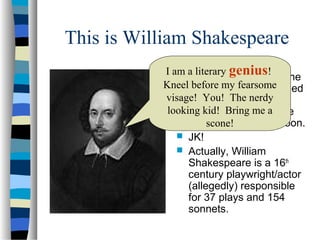
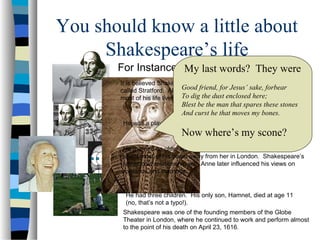
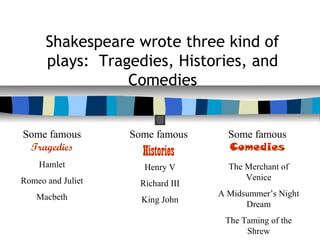
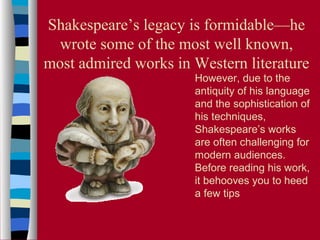
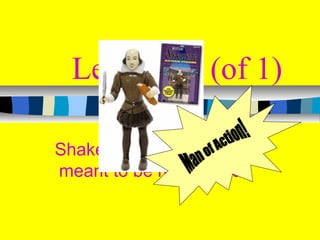
![Somebody volunteer! Read this
out loud!
Romeo.
[JULIET appears above at a window]
But, soft! what light through yonder window
breaks?
It is the east, and Juliet is the sun!
Arise, fair sun, and kill the envious moon,
Who is already sick and pale with grief,
That thou her maid art far more fair than she:
Be not her maid, since she is envious;
Her vestal livery is but sick and green,
And none but fools do wear it; cast it off.
It is my lady; O! it is my love:
O! that she knew she were.
ïŪ
Each time a character is
speaking, they are
presenting a single
thought, also known as
the thru-thought. The first
task an actor/reader must
accomplish is figure out
what is the main idea of
the speechâwhy does it
exist?
ïŪ
Read the speech again.
In your own words, what is
the main thought Romeo
expresses?](https://image.slidesharecdn.com/howtoreadshakespeare-140221103449-phpapp02/85/How-to-read-shakespeare-7-320.jpg)
![Okay, so you figured out Romeoâs
overwhelmed with loveâ the next step is
to read it that way!!
Romeo.
[JULIET appears above at a window]
But, soft! what light through yonder window
breaks?
It is the east, and Juliet is the sun!
Arise, fair sun, and kill the envious moon,
Who is already sick and pale with grief,
That thou her maid art far more fair than she:
Be not her maid, since she is envious;
Her vestal livery is but sick and green,
And none but fools do wear it; cast it off.
It is my lady; O! it is my love:
O! that she knew she were.
ïŪ
Shakespeare would give each
actor their lines about three days
before the performance. The only
way his actors could memorizeâ
and make sense ofâthe parts was
to figure out the main ideaâor thru
thoughtâof each line of dialogue.
Remember, just because a line
ends, does not mean the thru
thought is over! Keep going until
itâs done!
ïŪ
Read this with passion! Like you
are overcome! You will find that
even if you donât understand the
words, you still understand the
point of the dialogue because you
recognize the underlying emotion.](https://image.slidesharecdn.com/howtoreadshakespeare-140221103449-phpapp02/85/How-to-read-shakespeare-8-320.jpg)
![Next, pay attention to all the little clues
William left you to help you figure out
how it should be read
Romeo.
[JULIET appears above at a window]
But, soft! what light through yonder window
breaks?
It is the east, and Juliet is the sun!
Arise, fair sun, and kill the envious moon,
Who is already sick and pale with grief,
That thou her maid art far more fair than she:
Be not her maid, since she is envious;
Her vestal livery is but sick and green,
And none but fools do wear it; cast it off.
It is my lady; O! it is my love:
O! that she knew she were.
When you see one of theseââOââ do not
say âoh!â This is meant to be a cry of
passion, and is known as Ecphonesis O.
End-stop punctuation like
periods (.), question marks (?), and
exclamation points (!) means the
thought is complete. In other
words, STOP and breathe!
Commas indicate an elaboration
of the main pointâthey continue
the thru-thought in greater detail.
When an actor encounters a
comma, they should usually
pause, but not long enough to
take a breath.
Colons and semi-colons indicate
the initial thought is complete, but
not the thru-thought. They should
be treated like a commaâpause,
but just for a moment!](https://image.slidesharecdn.com/howtoreadshakespeare-140221103449-phpapp02/85/How-to-read-shakespeare-9-320.jpg)
